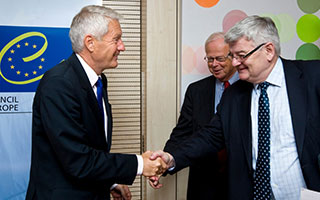Living Together - Diversity and Freedom in Europe

The group consisted of 9 high-ranking individuals with a specific expertise and a particular interest in the subject. Joschka Fischer was the Chairman. Edward Mortimer was the rapporteur responsible for preparing the draft report.
The other members were: Timothy Garton Ash (United Kingdom), Emma Bonino (Italy), Martin Hirsch (France), Danuta Hubner (Poland), Ayse Kadioglu (Turkey), Sonja Licht (Serbia), Vladimir Lukin (Russia), Javier Solana Madariaga (Spain).
In the first part of its report and referring to the principles of the European Convention on Human Rights, the Group highlights eight specific risks to traditional Council of Europe values:
- rising intolerance
- rising support for xenophobic and populist parties ;
- discrimination ;
- the presence of a population virtually without rights ;
- parallel societies ;
- Islamic extremism ;
- loss of democratic freedoms ;
- a possible clash between "religious freedom" and freedom of expression.
In the second part of its report, the Group begins by setting out 17 principles which it believes should guide Europe's response to these threats, starting with the statement that "at a minimum, there needs to be agreement that the law must be obeyed, plus a shared understanding of what the law is and how it can be changed".
- It then goes on to identify the main actors able to bring about the necessary changes in public attitudes: educators, mass media, employers and trade unions, civil society, churches and religious groups, celebrities and "role models", towns and cities, member states, and European and international institutions.
- The report then concludes with 59 "proposals for action".
Presentation of the Group of Eminent Persons’ report by Thorbjørn Jagland and Emma Bonino
The Parliamentary Assembly welcomes the report of the Group of Eminent Persons
Born in 1963 in the suburbs of Paris, Martin Hirsch is the former High Commissioner for Active Solidarities against Poverty and for Young People in the French government. He holds a Master in Neurobiology and attended the Ecole Normale Supérieure as well as the National School of Administration and then became an Auditor in the Council of State.
He entered politics in 1997 as Head of Office of Bernard Kouchner (Secretary of State for Health and Social Action) and advisor to the Private Office of Martine Aubry. After having spent seven years as the President of the Central Union of Emmaüs Communities (1995-2002), he became the President of Emmaüs France in 2002.
He retired in 2007 following his nomination to the French government. Desiring to put an end to the left-right divide in French politics, he has implementend the "Income of Active Solidarity", one of President Sarkozy's campaign promises. Between 2009 and 2010 he has combined this function with the post of Youth Commissioner. After the regional elections, Mr. Hirsch left the French government and is now the President of the Civic Service Agency since May 2010.

